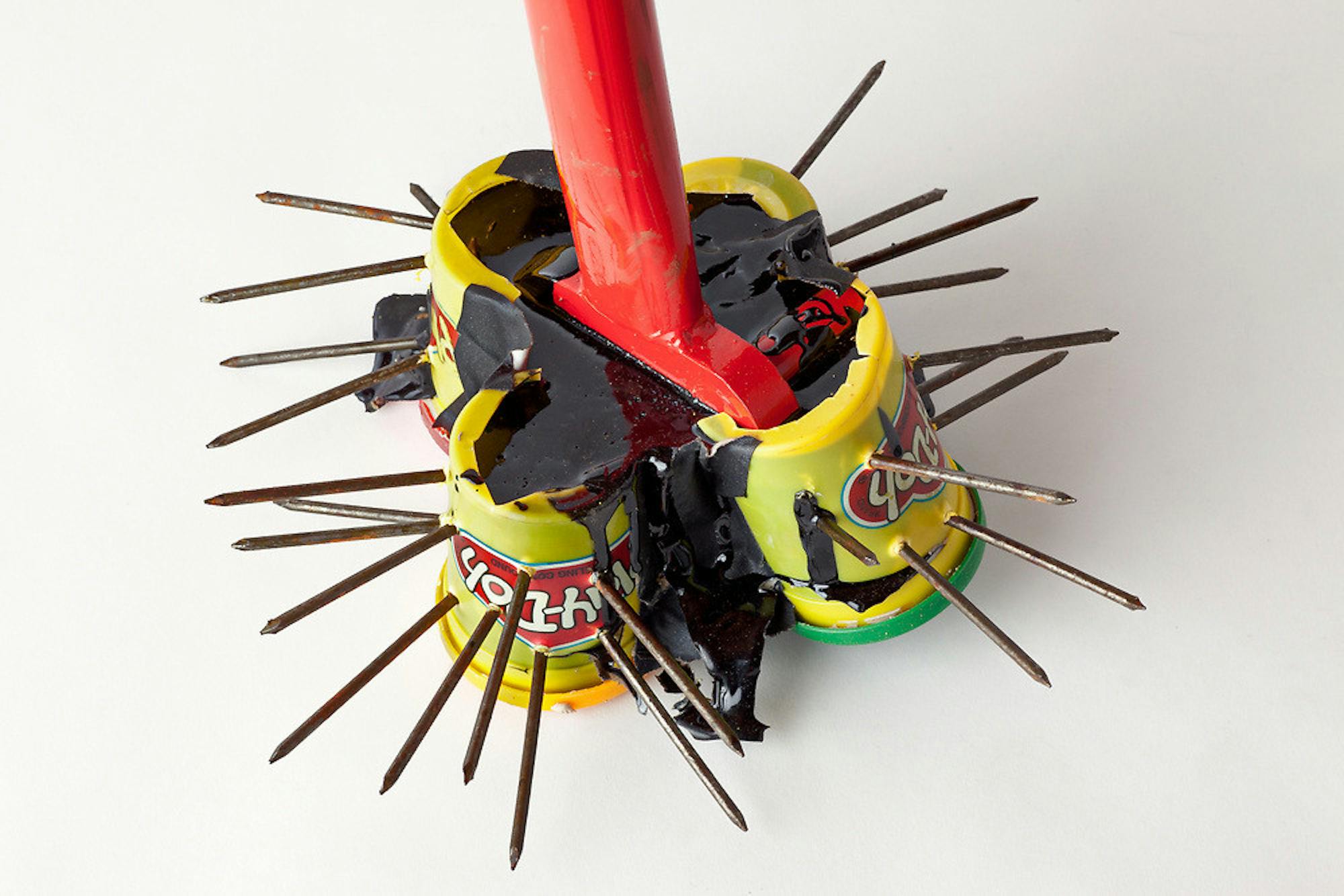Tufts University Art Galleries' current spring semester Medford exhibition, which will open on Jan. 17 and close on April 14, offers a focused look at L.A. based contemporary artist Harry Dodge. The show, entitled,“Harry Dodge: Works of Love,” bears the same name as the artist’s latest group of works and features his illustrations, videos and sculptures. The show begins with these works, which consist mainly of sculptures as well as some of his drawings. Dodge’s sculptures are positively dynamic with works like "Pure Shit Hotdog Cake” (2017), which is covered in technicolor drip paint. While Dodge’s work is deeply steeped in critical thought, his work is often times playfully clever and deals with the absurdity and fears of modern day life.
As the opening wall text will tell viewers, Dodge is as much a writer and avid reader as he is an artist. His art draws heavily on philosophical texts and the myriad of references he makes to postmodern theory can be found on corresponding wall texts. Dodge’s sources range from well-known philosopher Judith Butler, cultural theorist Benjamin Bratton, French poet and philosopher Édouard Glissantand more.Dodge is also currently working on a fourth book from Penguin Press "My Meteorite (Or, Without the Random There Can Be No New Things)", which takes a look into the artist's life. Although Dodge is incredibly well-read, one does not have to be so book-savvy to enjoy his work. Many of his illustrations are still incredibly funny even if one isn’t familiar with the deep philosophical ideas behind them.
One can quickly deduce the unique character of Dodge’s sculptures as they are often adorned with various robot-like appendages and industrial hardware. Something about the sculptures is strangely human, as denoted by their symmetry and scale, but the materials used to make them are so deeply linked with machines that they invite deeper inspection.
As noted in the exhibition’s press release, “Inspired by concepts like French poet and philosopher Édouard Glissant’s notion of 'consenting not to be a single being,' Dodge’s creations are simultaneously ascendant and broken—objects that suggest unwieldiness: states fluctuating between the analog and digital, alien and earthly, material and virtual, me and you.”
The sculptures can be seen as a nod to the post-human, which seems to be a notion more relevant in common culture than ever. Given our increasing fear around the capabilities of artificial intelligence and popular TV shows like “West World” (2016–), there is an infinite amount of parallels one can draw between Dodge’s work and society’s anxieties towards these ever-impending realities.
Dodge’s obsession with contemporary fears surrounding security, surveillance and the internet are themes that most viewers can connect with. Also, given the depth of the wall texts, the exhibition poses a great opportunity for visitors to learn more about these philosophies and how they manifest in Dodge’s work. Many of Dodge’s sculptures feature a stacking element to them, drawing on Benjamin Bratton’s book “The Stack” where he argues a model for all geopolitical issues as a “stack” consisting of earth, cloud, city, address, interface and user. The cloud symbolizes the internet and everything it encompasses. Dodge’s work “Black Transparencies (The Cloud Polis draws revenue from the cognitive capital of its Users.)” (2017) stipulates the limits of this “stack” model, theorizing that human’s attention span is limited and that in turn, humans will eventually tire of the cloud. The sculpture is a physical and tangible philosophical argument, and while college students may not experience this style of debate in a philosophy classroom, it offers a new pathway for Tufts’ student audience to think in an interdisciplinary way.
The gallery will also be hosting a multitude of events relating to Dodge’s exhibition. Two events feature the artist himself, including a gallery tour with the artist on March 6 at 10 a.m. and a conversation at the Museum of Fine Arts, Boston with Dodge and painter Amy Sillman on March 6 at 7 p.m. Related events include a lecture with Nick Seaver, an assistant anthropology professor at Tufts, entitled “Algorithms and/as culture” on Feb. 13 and a poetry reading by Natalie Shapero on April 10 at 12:15 p.m. Make sure to go and check out the exhibition before it closes on April 14.
Tufts University Art Galleries' current exhibition 'Harry Dodge: Works of Love' explores philosophy and contemporary fears

Harry Dodge, Emergency Weapon #26 (play-doh cups and rebar bender), 2014. Rebar bender, play-doh containers, spray paint, nails, gaffer tape, urethane resin. Courtesy of the artist.





